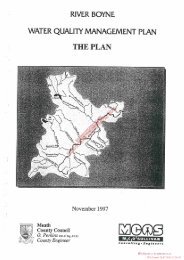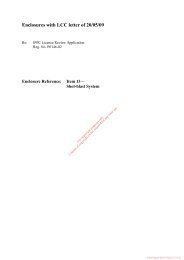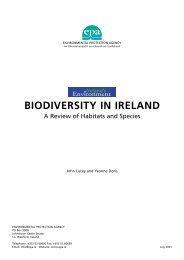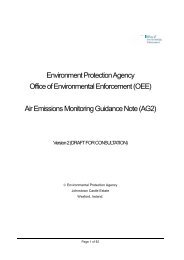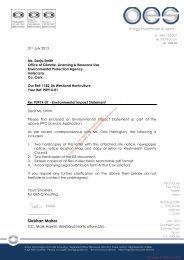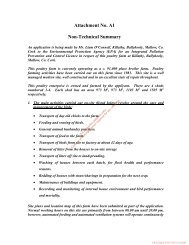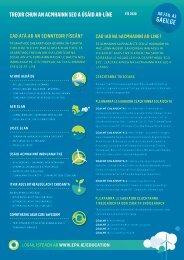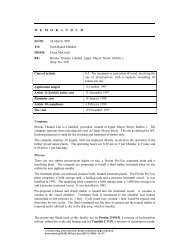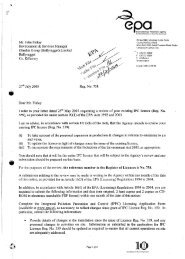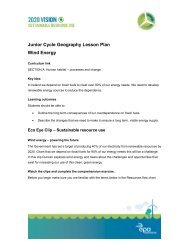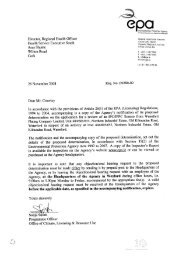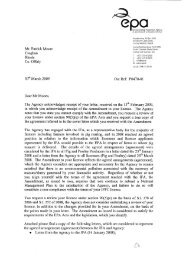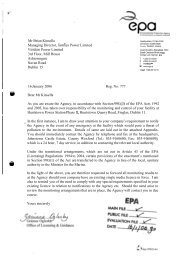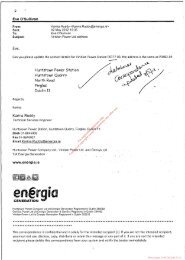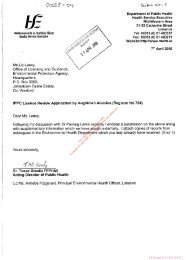environmental impact statement kilmainhamwood compost facility ...
environmental impact statement kilmainhamwood compost facility ...
environmental impact statement kilmainhamwood compost facility ...
Create successful ePaper yourself
Turn your PDF publications into a flip-book with our unique Google optimized e-Paper software.
5361- Kilmainhamwood Compost Facility Extension- EIS<br />
99/31/EC on the landfill of waste for the diversion of biodegradable municipal waste from landfill sites to<br />
<strong>compost</strong>ing and biogas plants and to other forms of waste recovery.<br />
The proposed extension of the Kilmainhamwood <strong>facility</strong> will provide additional capacity for the<br />
<strong>compost</strong>ing of additional biodegradable waste that will arise when the Food Waste Regulations are fully<br />
implemented.<br />
4.3.1.3 Biodegradable Waste Policy<br />
The National Strategy on Biodegradable Waste (2006) outlines Government policy for the diversion of<br />
biodegradable municipal waste (BMW) from landfill, building upon the key objectives established in<br />
policy documents Changing Our Ways (1998), Delivering Change - Preventing and Recycling Waste<br />
(2002) and Waste Management: Taking Stock and Moving Forward (2004). This sets ambitious targets<br />
for operational capacity to treat source separated food and garden waste by <strong>compost</strong>ing and anaerobic<br />
digestion for the following years;<br />
• By 2010 - 250,000 tonnes minimum<br />
• By 2013 - 320,000 tonnes minimum<br />
• By 2016 - 330,000 tonnes minimum<br />
The report states that a significant increase in biological treatment capacity is required to meet the<br />
targets set out by the Landfill Directive. This strategy is designed to secure the diversion of<br />
biodegradable municipal waste from landfill, the key benefit is to reduce the methane emissions from<br />
landfills and to encourage the separate collection of biodegradable waste.<br />
The proposed development is a component in achieving government policy and in fulfilling the<br />
requirements under the landfill directive.<br />
For inspection purposes only.<br />
Consent of copyright owner required for any other use.<br />
4.3.1.4 Animal By-Products Policy<br />
Animal By-Products Regulation (1774/2002/EC)<br />
Conditions for Approval and Operation of Composting Plants Treating Animal By-Products in Ireland –<br />
Department of Agriculture, Fisheries and Food<br />
The Department of Agriculture, Fisheries and Food (DAFF) Conditions for Approval and Operation of<br />
<strong>compost</strong>ing and biogas plants were finalised in March 2009. These Conditions are based on EU<br />
Regulation No.1774/2002 laying down health rules concerning animal by-products not intended for<br />
human consumption. This EU Regulation is enforced by Animal By-Products National Legislation -<br />
S.I.252 of 2008 and S.I.253 of 2008. The DAFF document sets out criteria of the conditions for approval<br />
of a Plant involved in the transformation of Animal By-Products in Ireland. This document provides<br />
details on requirements for feedstock, premises, hygiene requirements, processing/treatment<br />
standards, record keeping, sampling of <strong>compost</strong>, plant HACCP (Hazard Analysis and Critical Control<br />
Points) plans, collection and transport of organic fertiliser and soil improvers derived from <strong>compost</strong><br />
residues.<br />
53<br />
EPA Export 01-06-2010:03:55:53



